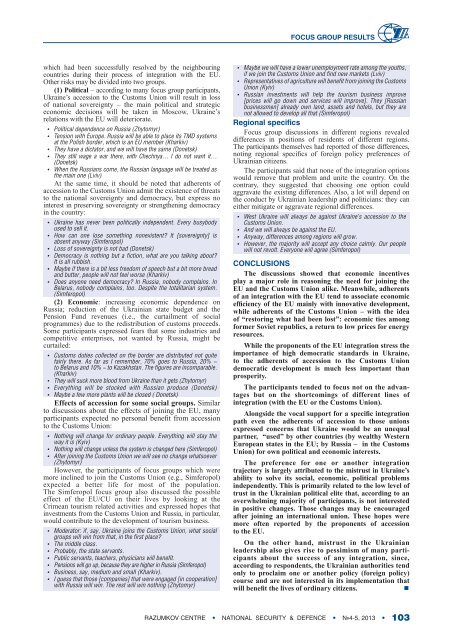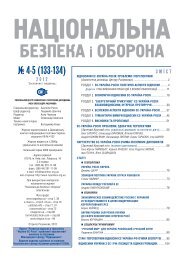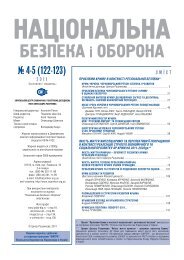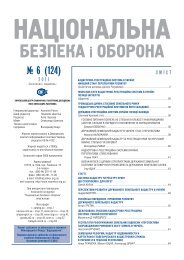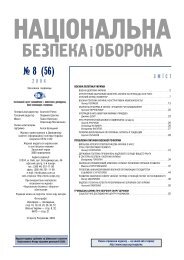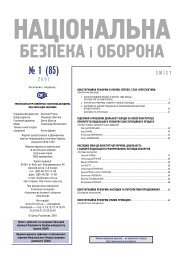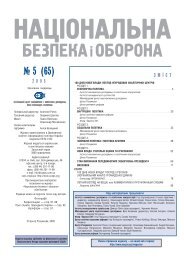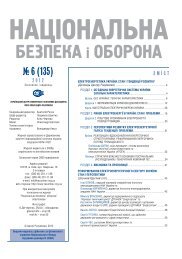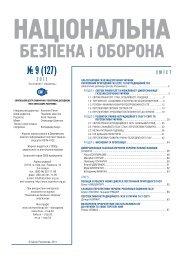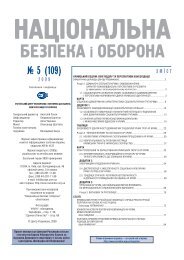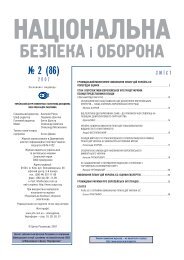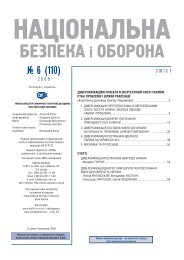RUSSIA THE EURASIAN CUSTOMS UNION AND THE EU COOPERATION STAGNATION OR RIVALRY?
RUSSIA, THE EURASIAN CUSTOMS UNION AND THE EU ...
RUSSIA, THE EURASIAN CUSTOMS UNION AND THE EU ...
- No tags were found...
You also want an ePaper? Increase the reach of your titles
YUMPU automatically turns print PDFs into web optimized ePapers that Google loves.
FOCUS GROUP RESULTS<br />
which had been successfully resolved by the neighbouring<br />
countries during their process of integration with the <strong>EU</strong>.<br />
Other risks may be divided into two groups.<br />
(1) Political – according to many focus group participants,<br />
Ukraine’s accession to the Customs Union will result in loss<br />
of national sovereignty – the main political and strategic<br />
economic decisions will be taken in Moscow, Ukraine’s<br />
relations with the <strong>EU</strong> will deteriorate.<br />
• Political dependence on Russia (Zhytomyr)<br />
• Tension with Europe. Russia will be able to place its TMD systems<br />
at the Polish border, which is an <strong>EU</strong> member (Kharkiv)<br />
• They have a dictator, and we will have the same (Donetsk)<br />
• They still wage a war there, with Chechnya… I do not want it…<br />
(Donetsk)<br />
• When the Russians come, the Russian language will be treated as<br />
the main one (Lviv)<br />
At the same time, it should be noted that adherents of<br />
accession to the Customs Union admit the existence of threats<br />
to the national sovereignty and democracy, but express no<br />
interest in preserving sovereignty or strengthening democracy<br />
in the country:<br />
• Ukraine has never been politically independent. Every busybody<br />
used to sell it.<br />
• How can one lose something nonexistent? It [sovereignty] is<br />
absent anyway (Simferopol)<br />
• Loss of sovereignty is not bad (Donetsk)<br />
• Democracy is nothing but a fiction, what are you talking about?<br />
It is all rubbish.<br />
• Maybe if there is a bit less freedom of speech but a bit more bread<br />
and butter, people will not feel worse (Kharkiv)<br />
• Does anyone need democracy? In Russia, nobody complains. In<br />
Belarus, nobody complains, too. Despite the totalitarian system.<br />
(Simferopol)<br />
(2) Economic: increasing economic dependence on<br />
Russia; reduction of the Ukrainian state budget and the<br />
Pension Fund revenues (i.e., the curtailment of social<br />
programmes) due to the redistribution of customs proceeds.<br />
Some participants expressed fears that some industries and<br />
competitive enterprises, not wanted by Russia, might be<br />
curtailed:<br />
• Customs duties collected on the border are distributed not quite<br />
fairly there. As far as I remember, 70% goes to Russia, 20% –<br />
to Belarus and 10% – to Kazakhstan. The figures are incomparable.<br />
(Kharkiv)<br />
• They will suck more blood from Ukraine than it gets (Zhytomyr)<br />
• Everything will be stocked with Russian produce (Donetsk)<br />
• Maybe a few more plants will be closed ( Donetsk)<br />
Effects of accession for some social groups. Similar<br />
to discussions about the effects of joining the <strong>EU</strong>, many<br />
participants expected no personal benefit from accession<br />
to the Customs Union:<br />
• Nothing will change for ordinary people. Everything will stay the<br />
way it is (Kyiv)<br />
• Nothing will change unless the system is changed here (Simferopol)<br />
• After joining the Customs Union we will see no change whatsoever<br />
(Zhytomyr)<br />
However, the participants of focus groups which were<br />
more inclined to join the Customs Union (e.g., Simferopol)<br />
expected a better life for most of the population.<br />
The Simferopol focus group also discussed the possible<br />
effect of the <strong>EU</strong>/СU on their lives by looking at the<br />
Crimean tourism related activities and expressed hopes that<br />
investments from the Customs Union and Russia, in particular,<br />
would contribute to the development of tourism business.<br />
• Moderator: if, say, Ukraine joins the Customs Union, what social<br />
groups will win from that, in the first place?<br />
• The middle class.<br />
• Probably, the state servants.<br />
• Public servants, teachers, physicians will benefit.<br />
• Pensions will go up, because they are higher in Russia (Simferopol)<br />
• Business, say, medium and small (Kharkiv).<br />
• I guess that those [companies] that were engaged [in cooperation]<br />
with Russia will win. The rest will win nothing (Zhytomyr)<br />
• Maybe we will have a lower unemployment rate among the youths,<br />
if we join the Customs Union and find new markets (Lviv)<br />
• Representatives of agriculture will benefit from joining the Customs<br />
Union (Kyiv)<br />
• Russian investments will help the tourism business improve<br />
[prices will go down and services will improve]. They [Russian<br />
businessmen] already own land, assets and hotels, but they are<br />
not allowed to develop all that (Simferopol)<br />
Regional specifics<br />
Focus group discussions in different regions revealed<br />
differences in positions of residents of different regions.<br />
The participants themselves had reported of those differences,<br />
noting regional specifics of foreign policy preferences of<br />
Ukrainian citizens.<br />
The participants said that none of the integration options<br />
would remove that problem and unite the country. On the<br />
contrary, they suggested that choosing one option could<br />
aggravate the existing differences. Also, a lot will depend on<br />
the conduct by Ukrainian leadership and politicians: they can<br />
either mitigate or aggravate regional differences.<br />
• West Ukraine will always be against Ukraine’s accession to the<br />
Customs Union.<br />
• And we will always be against the <strong>EU</strong>.<br />
• Anyway, differences among regions will grow.<br />
• However, the majority will accept any choice calmly. Our people<br />
will not revolt. Everyone will agree (Simferopol)<br />
CONCLUSIONS<br />
The discussions showed that economic incentives<br />
play a major role in reasoning the need for joining the<br />
<strong>EU</strong> and the Customs Union alike. Meanwhile, adherents<br />
of an integration with the <strong>EU</strong> tend to associate economic<br />
efficiency of the <strong>EU</strong> mainly with innovative development,<br />
while adherents of the Customs Union – with the idea<br />
of “restoring what had been lost”: economic ties among<br />
former Soviet republics, a return to low prices for energy<br />
resources.<br />
While the proponents of the <strong>EU</strong> integration stress the<br />
importance of high democratic standards in Ukraine,<br />
to the adherents of accession to the Customs Union<br />
democratic development is much less important than<br />
prosperity.<br />
The participants tended to focus not on the advantages<br />
but on the shortcomings of different lines of<br />
integration (with the <strong>EU</strong> or the Customs Union).<br />
Alongside the vocal support for a specific integration<br />
path even the adherents of accession to those unions<br />
expressed concerns that Ukraine would be an unequal<br />
partner, “used” by other countries (by wealthy Western<br />
European states in the <strong>EU</strong>; by Russia – in the Customs<br />
Union) for own political and economic interests.<br />
The preference for one or another integration<br />
trajectory is largely attributed to the mistrust in Ukraine’s<br />
ability to solve its social, economic, political problems<br />
independently. This is primarily related to the low level of<br />
trust in the Ukrainian political elite that, according to an<br />
overwhelming majority of participants, is not interested<br />
in positive changes. Those changes may be encouraged<br />
after joining an international union. These hopes were<br />
more often reported by the proponents of accession<br />
to the <strong>EU</strong>.<br />
On the other hand, mistrust in the Ukrainian<br />
leadership also gives rise to pessimism of many participants<br />
about the success of any integration, since,<br />
according to respondents, the Ukrainian authorities tend<br />
only to proclaim one or another policy (foreign policy)<br />
course and are not interested in its implementation that<br />
will benefit the lives of ordinary citizens.<br />
•<br />
RAZUMKOV CENTRE • NATIONAL SECURITY & DEFENCE • №4-5, 2013 • 103


